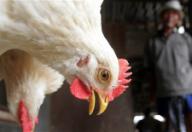Announcement - Wildlife Middle East - News - A New Regional Newsletter Focusing on Wildlife Issues in the Middle East
Wildlife Middle East - News - Issue 1, June 2006, pdf can be downloaded at:
www.wmenews.com
We are pleased to announce the creation of Wildlife Middle East - News, a new bilingual regional newsletter focusing on wildlife issues in the Middle East. The newsletter aims to contribute to the development of a network between zoo and wildlife professionals working in the Middle East with the objective of being the premier source of regional information on zoo and wildlife management, husbandry and care. The newsletter will publish articles with an emphasis on practical, useful and relevant material.
Proposed categories for articles include:
o Conservation education & environmental awareness.
o Husbandry & nutrition.
o Design of zoological facilities.
o Capture and translocation techniques.
o Wildlife diseases and preventive medicine
o Products, book reviews & research.
o Summaries of recent literature on Arabian animals.
o Letters and events.
Wildlife Middle East - News will be produced as a dual language
(English-Arabic) quality newsletter and will be published quarterly. The newsletter will be distributed to biology departments and libraries of institutes of higher education, agricultural and environmental agencies, conservation groups, wildlife projects, zoos, zoologists, veterinarians working with wild animals, veterinary hospitals involved in wildlife medicine, municipality veterinarians and pet shops. A PDF format newsletter will be e-mailed to a wider circulation of interested readers within and beyond the region.
We are interested to hear from individuals, institutions, zoos and conservation projects working with wildlife within the Middle East region or with wildlife species from the Middle East managed outside the region. If you have interesting findings, news or observations please submit articles to or request further information from the editors:
editors@wmenews.com
www.wmenews.com
The Editors
Tom Bailey, BSc, BVSc, MRCVS, Cert Zoo Med, MSc (Wild Animal Health), PhD, Dip ECAMS, Falcon and Wildlife Veterinarian, Dubai Falcon Hospital, PO Box 23919, Dubai, United Arab Emirates.
Declan O'Donovan, Dip.H.Ed., B.Sc., M.Sc. (Conservation Biology) CBiol, MIBiol, Director of Wildlife Services, Wadi Al Safa Wildlife Centre, PO Box 27875, Dubai, United Arab Emirates.
Chris Lloyd, BVSc, MRCVS, Cert Zoo Med, MSc (Wild Animal Health), Medical Director, Nad Al Shiba Vet Hospital, PO Box 116345, Dubai, United Arab Emirates.
Theri Bailey, BSc, MSc, Cert Ed, FRGS, Adjunct Instructor in Environmental Science, Zayed University, Dubai.
Tests Confirm Indonesian Child Died of Bird Flu
Reuters
14 July 2006
 JAKARTA (Reuters) - A three-year-old Indonesian girl who died this month has tested positive for bird flu according to tests by the U.S. Centers for Disease Control and Prevention in Atlanta, a health ministry official said on Friday. The child's death takes the number of human bird flu deaths in the country to 41.
JAKARTA (Reuters) - A three-year-old Indonesian girl who died this month has tested positive for bird flu according to tests by the U.S. Centers for Disease Control and Prevention in Atlanta, a health ministry official said on Friday. The child's death takes the number of human bird flu deaths in the country to 41.Lily Sulistyowati, the health ministry's spokeswoman, said the toddler had contact with sick fowl, the usual route of transmission of the H5N1 virus, which is endemic in poultry in almost all of Indonesia's 33 provinces.
"There was one dead chicken in her backyard," she said. Sulistyowati said there was no information on whether any other members of the toddler's family were also infected.
Indonesia has seen a steady rise in human bird flu infections and deaths since its first known outbreak of H5N1 in poultry in late 2003, and has registered more deaths this year than any other country. It has the second highest number of human deaths from bird flu after Vietnam.
Bird flu remains essentially an animal disease but many countries around the world are on alert over fears it might mutate into a form that passes easily among people and trigger a pandemic, possibly killing millions.
Scientists Study Thousands of Dead Fish in Eastern Lake Ontario
CBC news
14 July 2006
Environmental scientists are trying to determine what killed thousands of fish that washed up on Lake Ontario's eastern shore this month. New York State's Department of Environmental Conservation is trying to determine if a virus discovered this spring in some species, a botulism outbreak or something else may be the problem.
In June, scientists collected large numbers of dead round gobies and some dead muskies in the Thousand Islands area. Testing confirmed a virus known as viral hemorrhagic septicemia, or VHS, in several fish species from Lake Ontario and the St. Lawrence River. Environmental officials say VHS is relatively common in continental Europe and Japan, and poses no threat to humans.
An outbreak of botulism last year means officials will also test for the bacterium Clostridium botulinum, a nerve toxin that causes the rare but serious paralytic illness. In August, New York officials found several dead birds along the Lake Ontario shore and in the Thousand Islands that tested positive for Type E botulism.





No comments:
Post a Comment